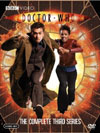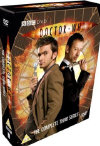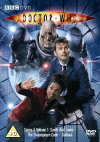DVD Extras (box sets only) include:
Of course, delving into Earth's past to demonstrate the time travel aspect of the show is predictable, as is a certain "-(yawn)- Let's not get too excited about this one" attitude on the part of the show's core sci-fi fans, myself included. And we're not leaving England either, so the TARDIS's ability to take us to explore new cultures isn't having its finest hour. However, all said and done, there's a certain educational flavour to the setting that goes right back to Doctor Who's roots in trying to alternate between teaching history and science. As just about every English-speaking highschool student gets some exposure to Shakespeare and a rough understanding of the culture and theatre he designed his works for, Doctor Who achieves a minor coup by not only recreating the era but also by going right back to the actual theatre and making it a central feature of an adventure. Nice one. Let's see if schools don't start showing this episode to students when they want to talk about the theatre of Shakespeare's day.
"What have butterflies ever done to you?"Sadly, as with the very first historical stories, the ugly old time-travel non-interference issues worry the writer and characters until they needlessly stick their feet in their mouths on the subject. Maybe the episode should be kept out of schools before popularizing the wrong idea. Yes, allowing a different version of history to unfold is an important possibility to maintain, in order to keep some suspense in the drama for the time travelers. (Donald Tosh could take some notes there.) But latching onto the one special effect in "Back to the Future" that completely buggers up its time travel integrity (and is still a disappointment to director Robert Zemeckis to this day) is a horrible idea.As we pointed out in our review for "Father's Day" (story no. 167), no version of history or element of a version of history that you remember is in danger of vanishing or fading away in a special effect. It always exists in its own universe parallel to whatever version you may be experiencing now. Characters are also allowed to speak freely and get time-travel theory wrong, but how disappointing to see the Doctor doing it when he was so brilliant at explaining where parallel universes came from last season. So sad.
"He's a bit different to his portraits!"Arguably the character of Shakespeare himself is open to some interpretation, since reportedly so little is known about him as a person himself. However, we do know what he looked like, thanks to his portraits, and he strikes me as an introverted type, who likes to be holed up with books, spending more time writing than was probably healthy. Dean Lennox Kelly comes out to play him with the image and style one would expect more from the leading man in a play than its writer though. A nice compelling character, mind you, but I have a hard time believing that that was Shakespeare.Yet another red flag goes up in the temporal mechanics field when the invention of several of Shakespeare's more famous quotes threatens to get caught in a time loop. Which came first, the chicken or the egg? If the Doctor recites Shakespeare's best lines back to him before he invents them, even though it was Shakespeare's writing that first put those lines in the Doctor's head, the original invention of the lines no longer exists. Of course, the constant every-choice-at-every-moment-creates-another-parallel-universe theory can easily render this a moot point, but since Gareth Roberts seems oblivious of this theory, I still wonder what his intent towards the source of these quotes was? If indeed it ever bothered him to think it through.
Style Over SubstanceFinally we come to the trio of adversaries that the Doctor and company need to contend with. The three characters maintain a decent standard set by Doctor Who villains without particularly standing out, or being too original. One can virtually expect the debunking of the supernatural to reveal scientific, extra-terrestrial roots, this time nicely not throwing out the supernatural entirely. But the extra-terrestrial side of things never really comes into its own. In this story, it just seems to be the usual, standard explanation, and remains underdeveloped. Equally underdeveloped are the nuts and bolts of the workings of the psychic energies that form the strategic battlefield of the story, something I feel I can only go into in the In-depth Analysis version of this review since it will involve spoilers.
Final CurtainThe story climaxes with a decent spectacle and an attempt at some unusual dynamics. It is sad though that the ending is so difficult on the ear. One might be tempted to think that the sound and music is simply overpowering the dialogue, despite everyone having re-dubbed their lines in the studio. But even watching it the second time through, I couldn't understand what was being said without turning on the closed captions on my DVD. Too bad, because the lines actually display a nice bit of cleverness, and the seed of a great idea.There's a great coda to this adventure - one of the best moments of the story, not to be missed. Very cool.
This story has become available on DVD:
Note: The full season sets contain commentaries, behind-the-scenes featurettes, and other extras. The smaller volumes only feature the plain episodes. Comments on this article are welcome. You may contact the author from this page:
|









